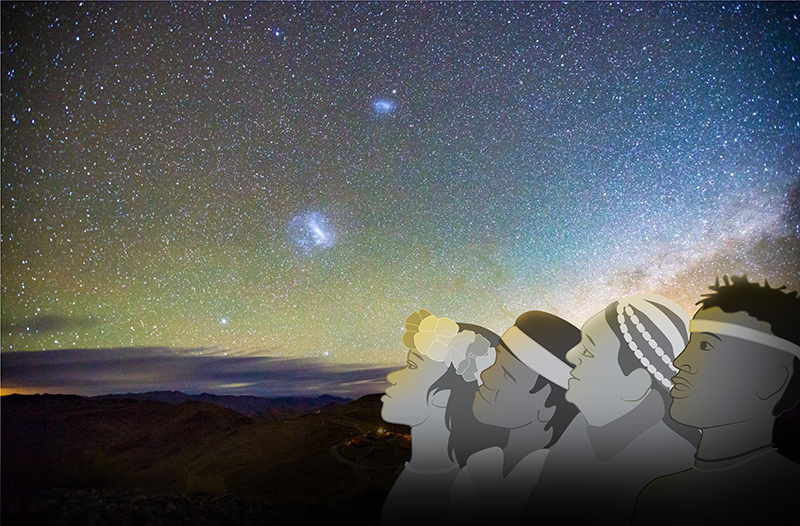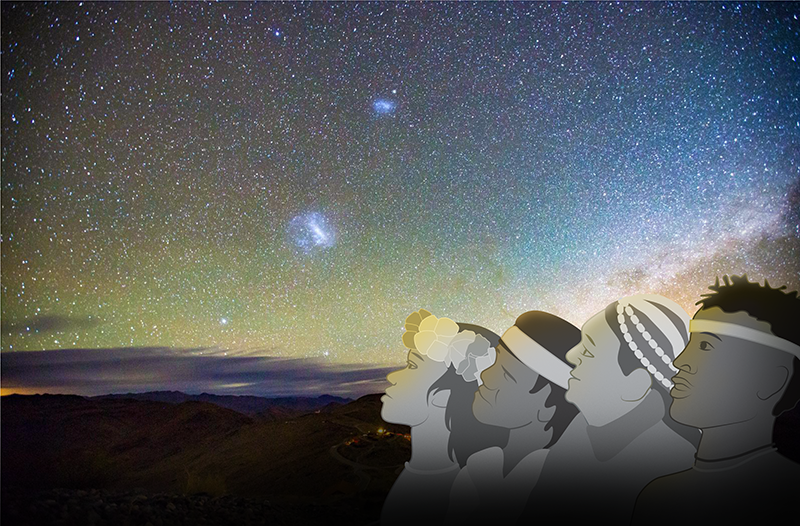Astronomers Need to Rename the Magellanic Clouds
The Milky Way is surrounded by a host of smaller satellite galaxies, the two brightest of which are known as the Large and Small Magellanic Clouds. Both galaxies are visible to the naked eye, and both have been known for centuries by viewers of the Southern Sky. But the beauty of these starry objects is clouded by their names, which honor a man who was a colonizer, a slaver, and a murderer. Now I and a coalition of astronomers are calling for the scientific community to rename these galaxies, as well as other astronomical objects, institutions, and facilities that bear his name.
The Magellanic Clouds were named for Ferdinand Magellan, a Portuguese explorer who around 500 years ago led the first circumnavigation of the globe. During this expedition a scribe onboard Magellan’s ship wrote about two groups of stars that looked like clouds in the Southern night sky. These two systems are now known as the Magellanic Clouds.
Yet Magellan was no astronomer, and he was not the first to document these galaxies. Indigenous peoples across the Southern Hemisphere have names and legends for these systems that predate Magellan by thousands of years. For example, the Mapuche of modern-day Chile and Argentina call them Rvganko, or water ponds, which they think are in the process of drying out; the Kamilaroi of modern-day Australia regard the galaxies as places where people go after death; and the Arimi of modern-day Tanzania see the clouds as a man and a woman who help the Pleiades bring heavy rains during the rainy season. Magellan’s crew was also not the first Western team to write about the two galaxies; Arabic and Italian explorers are known to have described the galaxies at least a decade before Magellan embarked on his journey.
Furthermore, Magellan committed horrific acts. A first-hand account of Magellan’s expedition describes how, in what is now known as Argentina, Magellan enslaved the native Tehuelche people. He placed iron manacles on the “youngest and best proportioned” men, telling them that the manacles were gifts. In what became Guam and the Philippines, Magellan and his men burned villages and killed their inhabitants.
Despite his actions, Magellan has been—and continues to be—widely honored by the field of astronomy. Magellan’s name currently appears in over 17,000 peer-reviewed academic articles. His name is attached to astronomical objects such as a lunar crater and a Martian crater, both of which are named Magalhaens; the NASA Magellan spacecraft; the twin 6.5-m Magellan telescopes; and most recently, an under construction, next-generation extremely large telescope called the Giant Magellan Telescope. The Magellan telescopes are all located in Chile, a country with a history of violent Spanish conquest. Indeed, Magellan’s “discovery” of the Strait of Magellan allowed Spanish conquistadors to explore Chile’s coast and led to genocidal campaigns against the native Mapuche people.
I and many other astronomers believe that astronomical objects and facilities should not be named after Magellan, or after anyone else with a violent colonialist legacy. We would like the International Astronomical Union—the body in charge of naming astronomical objects—to rename the Magellanic Clouds. We hope other astronomical institutions, particularly the consortia that manage the 6.5-m Magellan telescopes and the upcoming Giant Magellan Telescope, will also revisit the use of Magellan’s name.
Names reflect community values. Naming objects, buildings, and places after people has long been a way for society to honor individuals for their discoveries, their accomplishments, or the values they symbolize. Magellan made no astronomical discoveries, and for many, he continues to be a symbol of imperialist and anti-Indigenous violence.
Magellan is not the first person with a questionable history that astronomy has glorified, and he will likely not be the last. As physicists Chanda Prescod-Weinstein, Sarah Tuttle, Lucianne Walkowicz, and Brian Nord wrote in a 2021 essay on the naming of the James Webb Space Telescope: “There will always be complications in naming monuments or facilities after individuals. No hero is perfect.” But as they also point out, we can and should choose names of people that represent our highest ideals.
When we uphold the names of people, such as Magellan, whose lives and legacies have actively caused harm, we alienate the communities who have been harmed. The communities that suffered because of Magellan have rich astronomical traditions that are often less valued than Western ones. Even within the field of professional astronomy, the repercussions of Spanish colonization continue to this day. For example, I am the first woman of primarily Filipino descent to become an astronomy professor in the United States, in part because lack of access to resources has historically prevented Filipinos from participating in astronomy research.
Astronomers like to say that “the night sky belongs to everyone.” If we truly believe that, shouldn’t we honor that ideal when we name the objects in this shared space? Shouldn’t we be deliberate about the words we use to describe the cosmos? After all, our job is to tell the story of the Universe—and as with all stories, the way we tell it matters.





